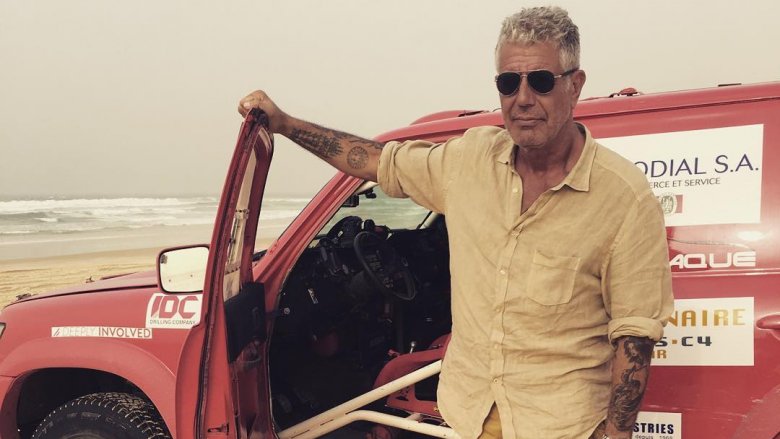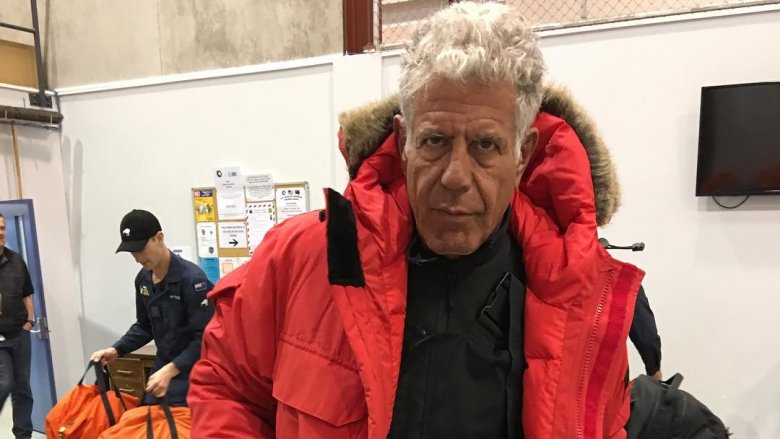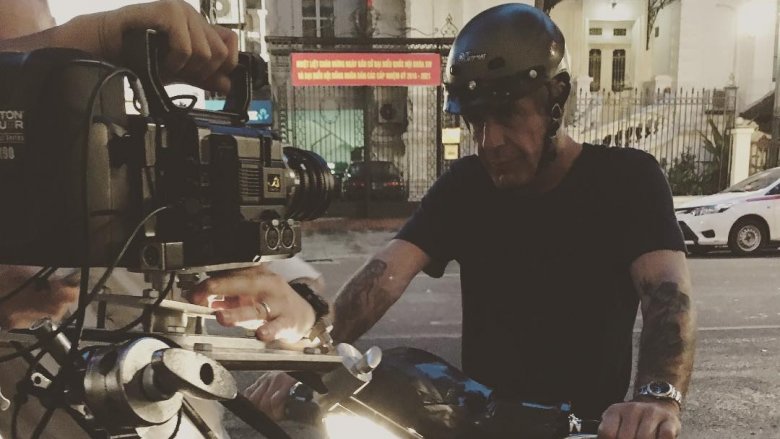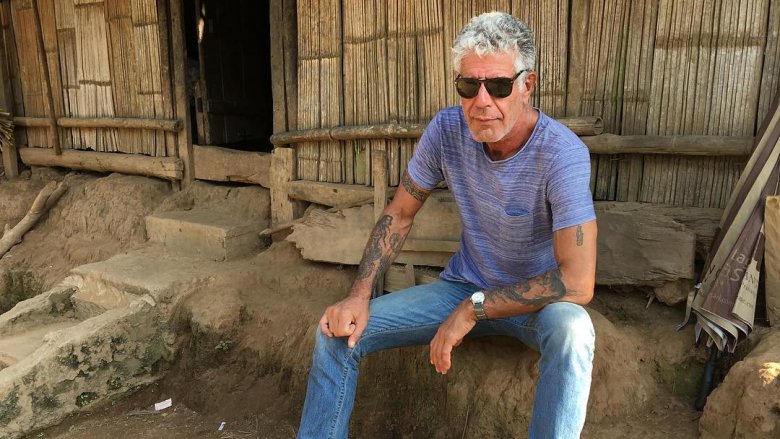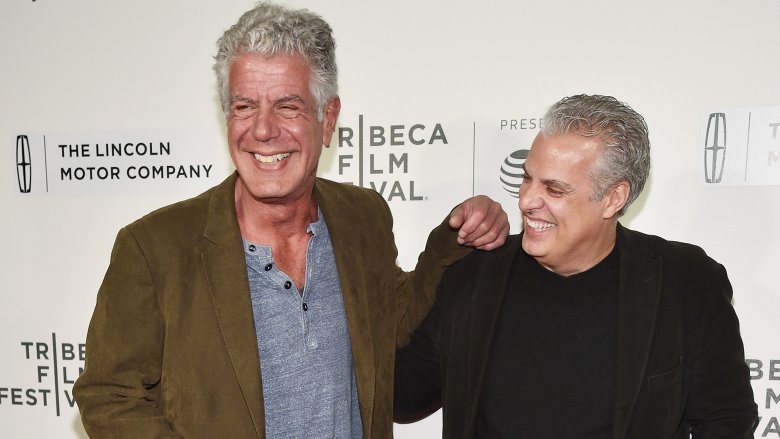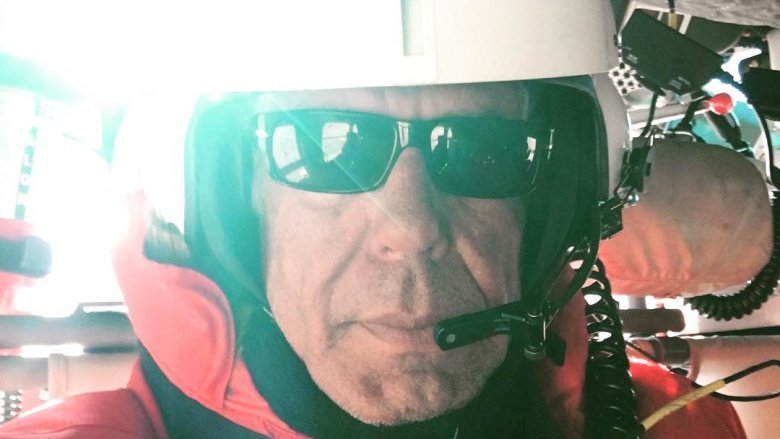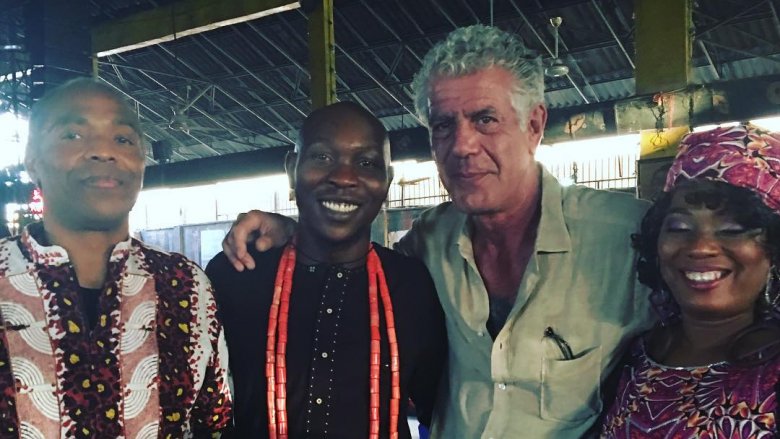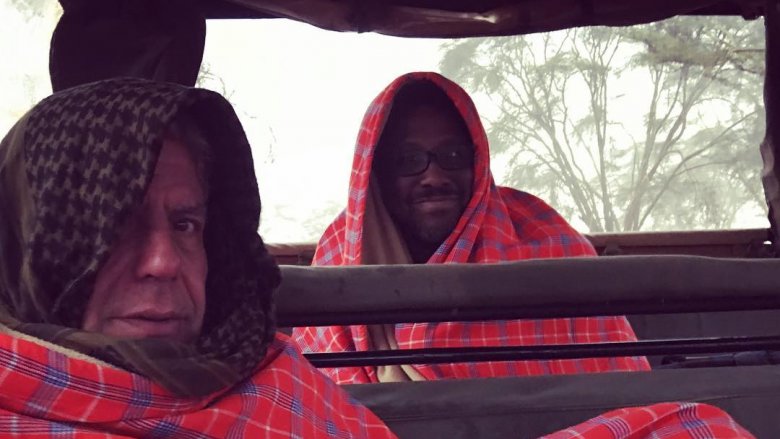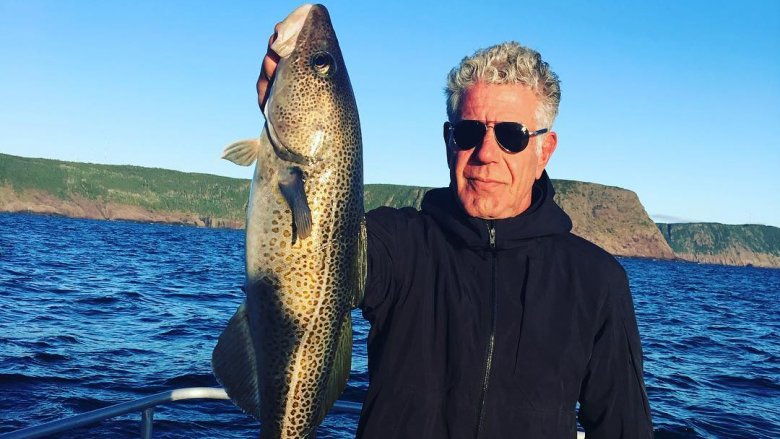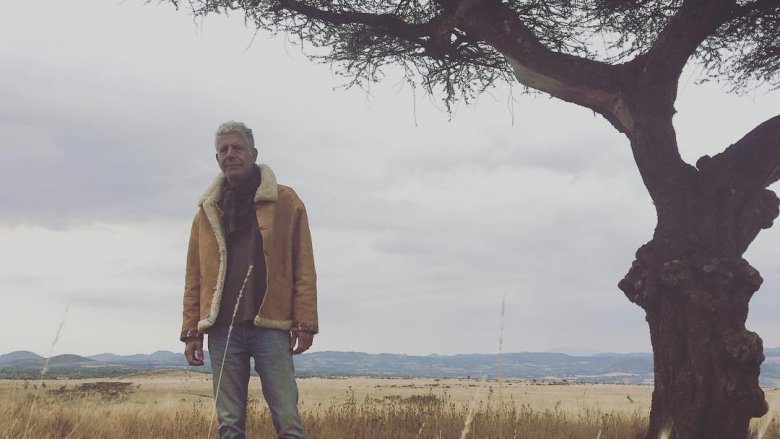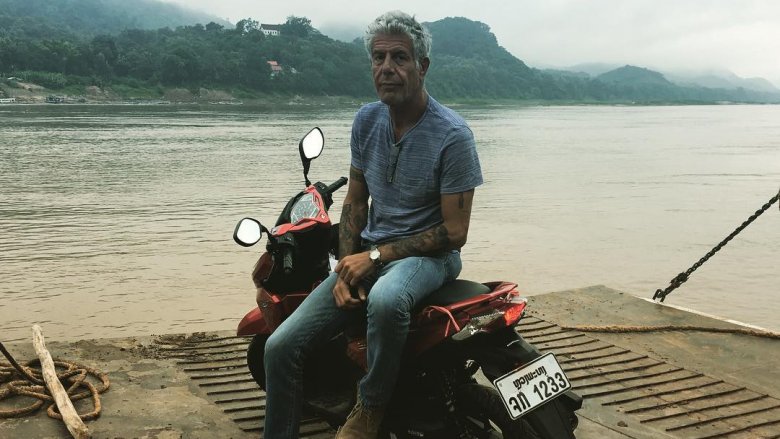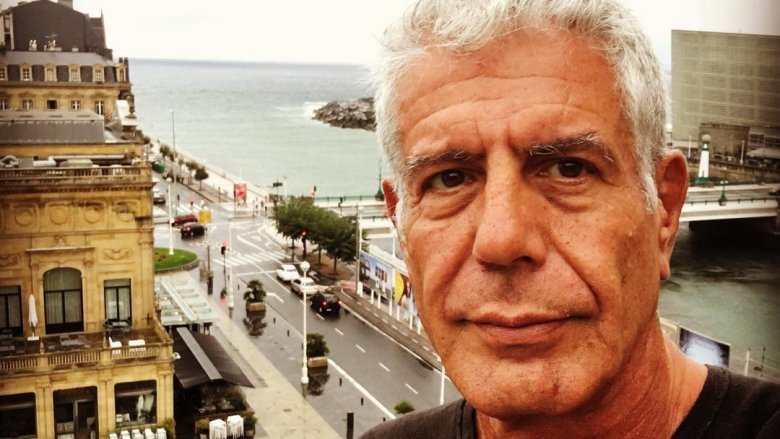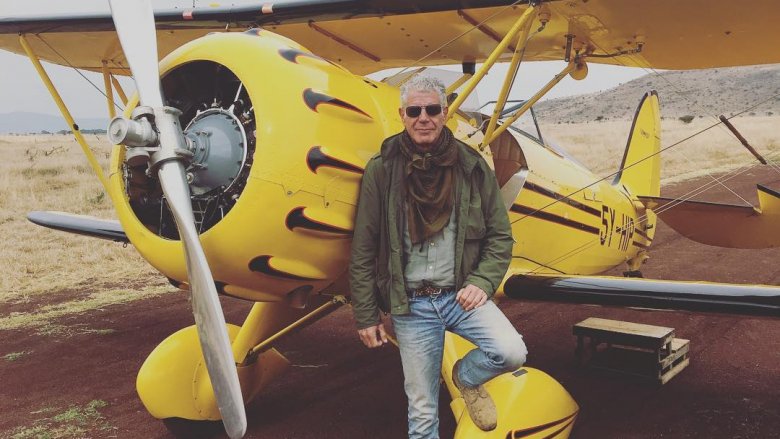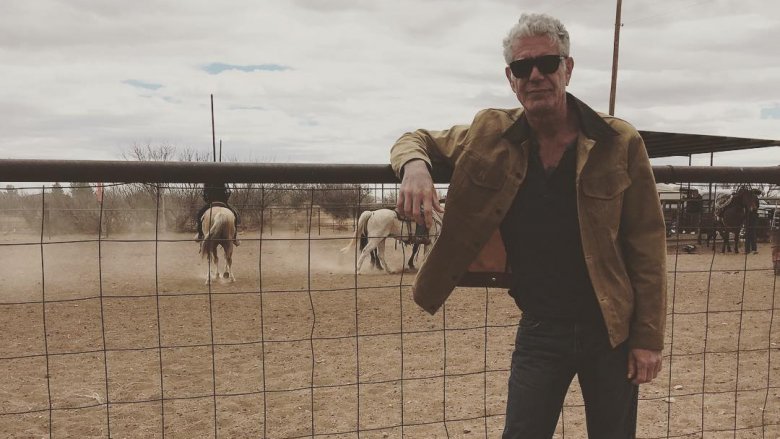The Untold Truth Of Anthony Bourdain: No Reservations
Anthony Bourdain was one of the most charismatic figures to ever hit the small screen. The star of several shows, Bourdain was most famous for traveling the world and sharing different cultures and food with his audience. While it wasn't his first TV show, No Reservations was the one that really put Bourdain on the map. The world will mourn Bourdain's untimely death for years to come, but fortunately we have shows like No Reservations to remember the cultural icon by.
Millions of people around the world watched and loved the show. They waited in eager anticipation to see which incredible destination Bourdain would journey to next — and what dishes he would try. Many felt like they knew Bourdain from watching him on TV, but how many know what went on behind the scenes of No Reservations? Let's take a deeper look at one of Bourdain's most beloved shows.
The initial pitch for the show
The premise of the show was a simple one, and that's exactly what made it work. No Reservations was the second incarnation of Bourdain's show A Cook's Tour which debuted on Food Network. Bourdain described his initial pitch for the show to The New Yorker: "I travel around the world, eat a lot of s***, and basically do whatever the f*** I want."
Bourdain was infamous for his "what you see is what you get" attitude, and his honesty served him well with viewers who gravitated towards his frank commentary. Bourdain didn't hold back on the profanity. Rather than making him appear uncouth, his colorful vernacular instead made him relatable to millions of fans around the world.
In a way, the popularity of No Reservations and Bourdain's other shows was a negative thing. The locales Bourdain visited would often become tourist traps, robbing them of their authenticity. "It's a gloriously doomed enterprise," said Bourdain. "I'm in the business of finding great places, and then we f*** them up."
It sparked his feud with Food Network
Food Network frequently came under Bourdain's fire. While it seemed he was sometimes being overly critical, his beef with the network went way back. One of the reasons Bourdain moved over to Travel Channel from Food Network was because of a falling out with the network. Bourdain was on a book tour in Spain when chef Ferran Adria invited him to his kitchen to film an episode of his show, but Food Network rejected the idea. He made the episode anyway and sold it to Travel Channel, who had no qualms about running the episode and it aired as a No Reservations special.
Years after Bourdain left the network, he would still openly criticize its chefs and shows. While he did say that he liked to "watch and enjoy Iron Chef America in all its cheesy glory," he also compared the show to a circus. According to Bourdain, the network's stars were largely intolerable. Emeril Lagasse was "unwatchable," Sandra Lee "pure evil," and Rachael Ray a woman with an annoying voice who "sells the smug reassurance that mediocrity is quite enough."
The show bombed when it first aired
It's hard to believe it now, but No Reservations was a spectacular failure when it first aired. Remember that this was not Bourdain's first foray into television, either. He had already hosted the obscure (at the time) A Cook's Tour on Food Network — a show with a very similar premise to No Reservations. Travel Channel was a fledgling network when No Reservations was first conceived, and was probably best known for its coverage of the World Poker Tour. This, combined with a little-known host, didn't exactly entice viewers to watch.
The pilot episode, set in France, reached fewer than a million viewers. The second episode of the series, where Bourdain traveled to Iceland, also bombed. Instead of cancelling the show, network execs decided to make it even bigger and bolder. "I knew this was someone they would respond to," Pat Younge, a former executive at Travel Channel told The Washington Post. "They just had to see him."
The strategy worked. Soon, viewers were tuning in not to see where Bourdain would travel next, but to see Bourdain himself. Gradually, the show became a hit and Bourdain became a household name.
People who appeared on the show have said that it literally changed their lives
The show had an incredible impact. There are the obvious things, like instilling in people a sense of adventure, and bringing little-known foods to international attention, but Bourdain also changed the lives of the people he met. One New York City restaurant said they owed their success to Bourdain.
Xi'an Famous Foods started as a simple noodle stand. After being featured on No Reservations in 2007, business started booming. Years later, the owner's son Jason Wang was able to tell Bourdain how the lives of everyone in his family had changed. "I approached Tony and told him, while he may have no idea what he has done for our family and business by simply saying he enjoyed the food, I wanted him to know it helped bring our family out from living in one room in Flushing to living the American Dream," he wrote on Twitter.
The restaurant paid homage to Bourdain by donating their earnings on the day Bourdain died to the National Suicide Prevention Lifeline. They made a profit of $73,509.76 and thanked their customers on Twitter for helping them honor Bourdain's memory.
There were some incredible guest stars
While Bourdain was the heart of the show, he wasn't its only star. Over the years, there were some incredible guests on No Reservations. Guest stars included Alice Cooper, Norah Jones, The Black Keys, Sean Penn, Bill Murray, and Iggy Pop.
Another mainstay of the show was Bourdain's fellow celebrity chef Eric Ripert. Ripert first appeared on A Cook's Tour and would continue to make appearances on his shows until Bourdain's death. The rapport between the two made for compelling television, but their friendship went far deeper than that. Ripert was one of Bourdain's closest friends, and it was Ripert who found Bourdain after his death from suicide.
Ripert was devastated by the loss. "Anthony was a dear friend," he told Today. "He was an exceptional human being, so inspiring and generous. One of the great storytellers of our time who connected with so many. I wish him peace. My love and prayers are with his family, friends and loved ones."
The crew found themselves in the middle of a war zone
Bourdain would sometimes find himself in dangerous locales, but perhaps the most frightening was when he ended up in the middle of a war zone in Lebanon. In 2006, war broke out between the militant group Hezbollah and Israel, just days after the No Reservations team landed in Beirut. As bombs threatened to decimate the city, Bourdain and the crew were forced to evacuate by boat.
The episode would end up being nominated for an Emmy award, but it almost didn't air. "I didn't feel I had the gravitas to tackle such a serious subject," Bourdain told Los Angeles Times. "I make a snarky show about food and travel."
Still unsatisfied with how the city was portrayed, Bourdain returned to Lebanon four years later for another episode. "The most urgent reason I'm here is because I have lived with a deep sense of dissatisfaction that I never got to show people how amazing this place is," he said.
The craziest things Bourdain ate on the show
To do what Bourdain did took not only an incredible sense of adventure, but also an iron stomach. He ate some pretty crazy foods for the show, but somehow managed to get sick only three times. He swallowed down everything from a warthog anus that had been cooked without a thorough cleaning in Namibia to fermented shark in Iceland. Those two dishes topped the list of foods Bourdain said he would never eat again — along with airplane food. "No one has ever felt better after eating plane food," he told Time.
According to Bourdain, the secret to not getting sick on the road is to eat what the locals eat. "I've long found that the person on our crew most likely to get sick is the one who is sort of wary of street food and local food," he told Newsweek. "They always get sick from eating the breakfast buffet at the hotel... You eat in crowded local joints, and chances are you're going to be OK."
It might be sound advice, but you can't really blame members of the crew for not wanting to eat raw seal eyeball. Bourdain said it's "not bad," but we'll take his word for it.
Everything was done in one take
One of the most endearing aspects of No Reservations was Bourdain's frank personality. The sincerity he brought to the screen helped viewers relate to him, and Bourdain recognized this. While most of reality TV is anything but, Bourdain didn't believe in faking anything on the show. Over the years, he worked to eliminate what he called "painful fakery."
"You won't see me entering the house or the restaurants meeting the chef," he told Forbes. "We don't do retakes and no thank you exits, it ruins everything." Bourdain added that since walk-ins are staged scenes, the entire episode would lose authenticity for starting out with a lie.
"It's already an artificial, weird construct, but with that kind of nonsense... it's only going to get worse," he said. "We hope this makes an essentially artificial process, less artificial."
One of the show's wildest episodes was filmed while Bourdain was drunk
Anthony Bourdain swore off filming in Sicily after a disastrous episode sent him into a flying rage. Bourdain has always committed to authenticity in his shows, so when a fisherman staged a cuttlefish and octopus expedition with dead seafood, Bourdain snapped. He thought he and the crew would be going to catch live seafood, but instead discovered that the fisherman accompanying them had thrown dead animals into the water for them to "catch."
Bourdain told Forbes that he was so angry at the duplicity that he began "pounding negronis" and was drunk in the episode's next scene. Bourdain was so intoxicated that he didn't even remember it, which turned out to be a good thing as the same fisherman had one more trick up his sleeve. He said he would be bringing them to his "traditional" restaurant which turned out to be anything but authentic.
"It was a low point," said Bourdain. "It's become a hideous, funny failure. But it wasn't funny to me down there where those dead octopi were splashing down behind my head... I'm still pissed about it."
Bourdain spent most of the year on the road
Filming more than a dozen episodes each season of a show that requires you to travel the globe can be taxing. Bourdain would often be out of the country for 250 days out of the year. While filming No Reservations, he also filmed two seasons of The Layover, another travel show with a much shorter timeline. While Bourdain and the crew would spend several days in each location for No Reservations, on The Layover they would only have 24-48 hours to build a story around each destination.
"I like doing what I do and I like doing sixteen episodes of No Reservations a year, but The Layover was hard on me," Bourdain told Eater. "It was hard with that much food and liquor in a two-day shooting period, back-to-back-to-back. And that's after shooting No Reservations."
The punishing schedule was necessary for the shows, but there was another reason Bourdain wanted to keep busy. "I know that free time is bad for me," he said. "If I have a lot of time to stare at the ceiling and think about the mysteries of the universe, it can be self-destructive."
Giving marginalized voices a platform
No Reservations was more than just a travel show. Bourdain also used it as a political platform. After filming an episode of the show in Saudi Arabia in 2008, international perception of the country shifted. In a piece for Elle, filmmaker Danya Alhamrani described what the dynamic figure (who she guided on his visit) had done for her country. "To this day... I'm still told by people I meet that the only good thing they see online about Saudi Arabia is the episode of No Reservations," she wrote. "I was informed that it was the highest viewed episode of any show on the Travel Channel at the time. People were hungry for real stories from Saudi Arabia, about real Saudis, and Tony finally gave us a voice."
Alhamrani added that more than simply filming in her country, Bourdain genuinely tried to get to know the culture and the people. "He experienced everything with an open mind and an open heart and relayed it very beautifully in the episode," she said.
The book is not what you think
Long before he became one of the most famous chefs and television personalities in the world, the young Bourdain dreamed of being a much different kind of artist. A huge comic book fan, Bourdain once wanted to become an illustrator. Later in his career, he would co-write two graphic novels. Bourdain's passion for art is evident in No Reservations — that is, the book version of No Reservations. Officially titled No Reservations: Around the World on an Empty Stomach, the book served as a companion to the show but was also a work of art in its own right. The journal of Bourdain's travels was fully illustrated, and included photos and other mementos of the chef's adventures.
His books were often overshadowed by his TV shows, but Bourdain was also a prolific writer. Some of his other titles include Kitchen Confidential, Appetites: A Cookbook, The Nasty Bits, and Medium Raw.
They didn't travel far for the finale
After years of filming in exciting cities around the world, fans expected No Reservations to go out with a bang. It did, but not in the way they expected. Instead of going to some remote location, Anthony Bourdain kept things local. Born in New York City and raised in New Jersey, Bourdain never spent much time getting to know the nearby NYC borough of Brooklyn. For the show's final episode, he decided to explore it. It was a sharp change from the international destinations viewers had come to expect from the show, but in many ways Brooklyn was a foreign country for Bourdain. The TV personality spent so much time traveling for his show that his own city became something of a stranger.
Setting the final episode in Brooklyn also drove home Bourdain's belief that travel is important, but that you don't need to go far to have an adventure. One of Bourdain's most beloved quotations declares his philosophy: "If I'm an advocate for anything, it's to move. As far as you can, as much as you can. Across the ocean, or simply across the river. Walk in someone else's shoes or at least eat their food. It's a plus for everybody."
The show ended so Bourdain could explore more places
The final episode of No Reservations was the end of an era, but also the start of a new one. Bourdain didn't end the show to quit traveling, but rather to travel to even more destinations. He moved to CNN and began work on Anthony Bourdain: Parts Unknown, which carried on the spirit of No Reservations and its predecessor, A Cook's Tour. "There are a lot of places where me and my team have been wanting to make television for a long time and haven't been able to," Bourdain told Adweek after No Reservations wrapped. "And CNN has the infrastructure and inclination to make those places doable."
Bourdain would end up working on Parts Unknown until his death. CNN mourned the loss Bourdain, as did the rest of the world. The network expressed their thoughts in a statement that reflected what millions around the world also felt: "His talents never ceased to amaze us and we will miss him very much."
If you or anyone you know is having suicidal thoughts, please call the National Suicide Prevention Lifeline at 1-800-273-TALK (8255).
